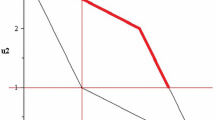Abstract
The fact that infinitely repeated games have many different equilibrium outcomes is known as the Folk Theorem. Previous versions of the Folk Theorem have characterized only the payoffs of the game. This paper shows that over a finite portion of an infinitely repeated game, the concept of perfect equilibrium imposes virtually no restrictions on observable behavior. The Prisoner's Dilemma is presented as an example and discussed in detail.
Similar content being viewed by others
References
Abreu, Dilip: 1988, ‘On the theory of infinitely repeated games with discounting’, Econometrica, 56, 383–396.
Aumann, Robert: 1974, ‘Subjectivity and correlation in randomized strategies’, Journal of Mathematical Economics, 1, 67–96.
Aumann, Robert: 1981, ‘Survey of repeated games’, in Essays in Game Theory and Mathematical Economics in Honor of Oscar Morgenstern, Robert Aumann (ed.), Mannheim: Bibliographisches Institut.
Aumann, Robert and Shapley, Lloyd: 1977, ‘Long-term competition - a game theoretic analysis’, mimeo, February.
Benoit, Jean-Pierre and Krishna, Vijay: 1985, ‘Finitely repeated games’, Econometrica, 53, 905–22.
Benoit, Jean-Pierre and Krishna, Vijay: 1987, ‘Nash equilibria of finitely repeated games’, International Journal of Game Theory, 16, 197–204.
Blanchard, Olivier: 1979, ‘Speculative bubbles, crashes, and rational expectations’, Economics Letters, 3, 387–389.
Cave, Jonathan: 1987, ‘Equilibrium and perfection in discounted supergames’, International Journal of Game Theory, 16, 15–41.
Friedman, James: 1984, ‘Trigger strategy equilibria in finite horizon supergames’, mimeo, University of North Carolina.
Fudenberg, Drew and Maskin, Eric: 1986, ‘The folk theorem in repeated games with discounting and with incomplete information’, Econometrica, 54, 533–54.
Guth, Werner, Leininger, Wolfgang, and Stephan, Gunter: 1988, ‘On supergames and folk theorems: A conceptual discussion’, Game Theory Working Paper No. 19, University of Bielefeld, October.
Kreps, David, Milgrom, Paul, Roberts, John, and Wilson, Robert: 1982, ‘Rational cooperation in the finitely repeated prisoner's dilemma’, Journal of Economic Theory, 1988, 27, 245–52.
Lockwood, Ben: 1988, ‘The folk theorem in dynamic games with and without discounting’, Birkbeck College mimeo, May.
Moreaux, Michel: 1985, ‘Perfect Nash equilibria in finite repeated game and uniqueness of Nash equilibrium in the constituent game’, Economics Letters, 17, 317–20.
Rasmusen, Eric: 1989, Games and Information, Oxford: Basil Blackwell.
Rubinstein, Ariel: 1977, ‘Equilibrium in supergames’, Hebrew University CRMEGT Research Memorandum No. 25, May.
Rubinstein, Ariel: 1979, ‘Equilibrium in supergames with the overtaking criterion’, Journal of Economic Theory, 21, 1–9.
Rubinstein, Ariel: 1982, ‘Perfect equilibrium in a bargaining model’, Econometrica, 50, 97–110.
Selten, Reinhard: 1978, ‘The chain store paradox’, Theory and Decision, 9, 127–59.
Author information
Authors and Affiliations
Additional information
I would like to thank an anonymous referee, Sushil Bikhchandani, David Hirshleifer, David Levine, Thomas Voss, and participants in the UCLA Game Theory Seminar for helpful comments.
Rights and permissions
About this article
Cite this article
Rasmusen, E. Folk theorems for the observable implications of repeated games. Theor Decis 32, 147–164 (1992). https://doi.org/10.1007/BF00134049
Issue Date:
DOI: https://doi.org/10.1007/BF00134049




